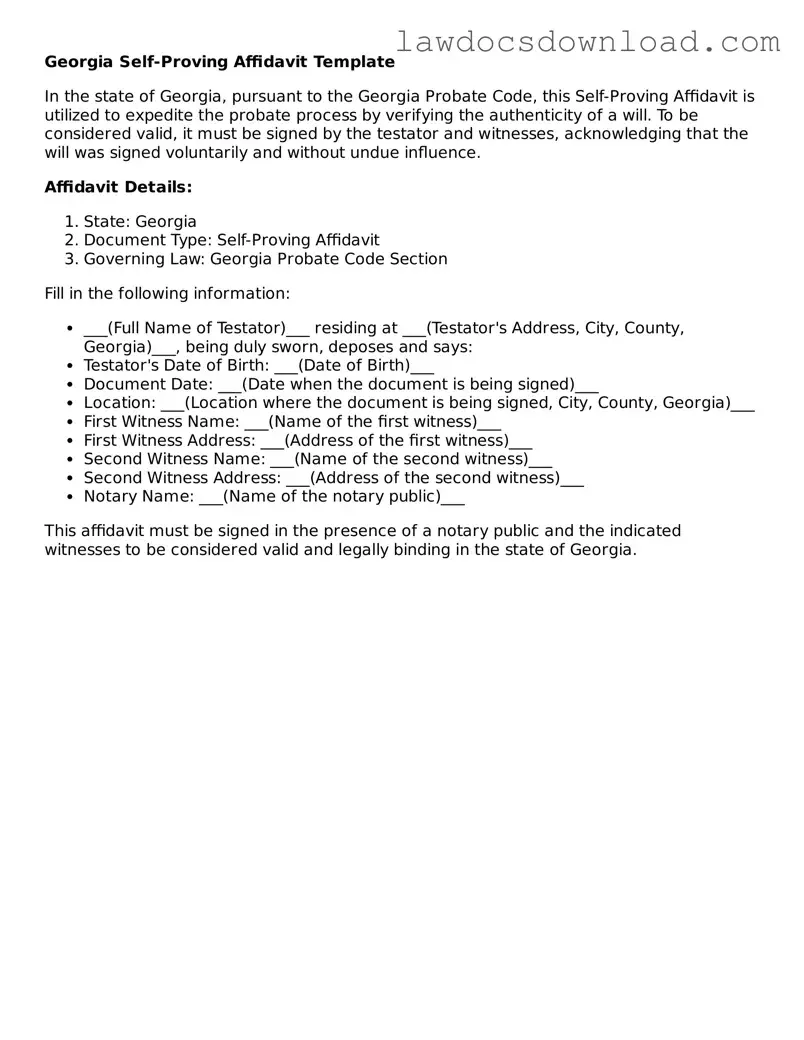When individuals set out to complete the Georgia Self-Proving Affidavit form, a variety of mistakes can occur, due in part to the form's legal nature and the detail-oriented process required. One common error is not having the form notarized, which is a crucial step for the document to be considered legally valid. The Self-Proving Affidavit must be signed in the presence of a notary public to authenticate it properly. This formal act acknowledges that the signers have indeed signed the document.
Another mistake often made is failing to use witnesses who meet the criteria set forth by Georgia law. The affidavit requires the signature of two disinterested witnesses who have no stake in the will. These individuals must be competent adults, and it's a common oversight to have witnesses who are too young, have a vested interest in the will, or otherwise do not qualify. This error can make the affidavit—and potentially the associated will—challenged or deemed invalid.
Incomplete information is a further issue that arises with the Georgia Self-Proving Affidavit. All fields must be filled out with accurate information pertaining to the individual creating the will (the testator), the witnesses, and the notary public. Leaving sections blank or entering inaccurate data can lead to questions concerning the document's validity and may require the parties involved to complete the process again, creating unnecessary delays and complications.
Incorrectly assuming that the affidavit is not necessary is another misstep. While not always legally required for a will to be valid, having a self-proving affidavit can significantly streamline the probate process. It serves as evidence that the will was executed properly, potentially avoiding the need for witnesses to testify to this effect in court. Skipping this step can result in a longer, more complicated probate process.
Some individuals also incorrectly complete the form on their own, without legal guidance, leading to misunderstandings about the requirements or nuances of the form. Legal terminology or the particularities of Georgia law can easily lead to mistakes. Consulting a legal professional can help ensure that the document is completed correctly and fulfills all legal requirements.
Using an outdated form can also create issues, as laws and regulations change over time. It is critical to ensure that the current version of the form is being used. This prevents the submission of a document that lacks newly required information or adheres to outdated standards, potentially invalidating the affidavit.
Misunderstanding the role of the affidavit in relation to the will itself is yet another common mistake. Some may erroneously believe that the affidavit is a substitute for a will, rather than a document that supplements and strengthens the will's validity. This misunderstanding can have serious implications for the estate planning process.
Lastly, failing to properly file or store the affidavit with the will can lead to difficulties in locating the document when it is needed, possibly hindering the probate process. It is crucial to keep the affidavit and the will together in a safe place and to inform executors or family members of their location to ensure smooth legal proceedings after the testator's passing.

